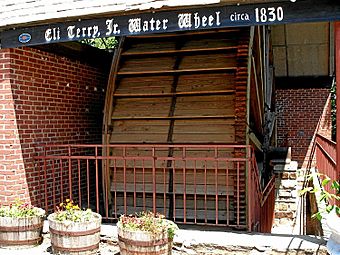Terryville Waterwheel facts for kids
Quick facts for kids |
|
|
Terryville Waterwheel
|
|
 |
|
| Location | 262 Main St., Plymouth, Connecticut |
|---|---|
| Area | 0.1 acres (400 m2) |
| Built | 1851 |
| Architectural style | high breast wheel |
| NRHP reference No. | 01001412 |
| Added to NRHP | January 4, 2002 |
The Terryville Waterwheel is an old and important water wheel in the Terryville area of Plymouth, Connecticut. You can find it near the Pequabuck River and Main Street. It was probably built in 1851 to help a local company make locks. This water wheel is special because it's one of only three water wheels from the 1800s still left in Connecticut. It was added to the National Register of Historic Places in 2002, which means it's recognized as a very important historical site.
About the Terryville Waterwheel
The Terryville Waterwheel is located in Terryville. This area was once a busy place for factories in the 1800s. Today, it's the main shopping area of the town. The wheel sits on the west side of the fast-flowing Pequabuck River, right by Main Street.
How the Waterwheel Looks
The water wheel is made from wood and iron. It sits in its original well, which is built from rough stones topped with concrete. The wheel is about 22 feet (6.7 meters) tall and 7 feet (2.1 meters) wide. A special shelter was built over it in 1951 to protect it.
Most parts of the wheel are now made of treated wood. These parts replaced the original materials during a repair project in 1990-1991. The main rod, called the axle, is made of cast iron. It has a cast iron center piece where the wheel's arms are attached. Metal bolts hold the arms to the center, and iron rods cross-brace them for strength.
The Waterwheel's Story
People used to think this water wheel was built in 1824. That's when Eli Terry's clock factory was first built here. However, that factory burned down in 1851. The Lewis Lock Company, which owned it then, rebuilt the factory. It's believed that the water wheel we see today was put in place around that time.
The wheel got its power from water flowing from a dam further up the river. The water traveled through a wooden channel, called a head race. Both the dam and the channel are no longer there. This water wheel helped power the lock-making businesses until about 1940. That's when the factory building was taken down. Among the three water wheels from the 1800s still in Connecticut, the Terryville Waterwheel is the best preserved.
 | Victor J. Glover |
 | Yvonne Cagle |
 | Jeanette Epps |
 | Bernard A. Harris Jr. |



